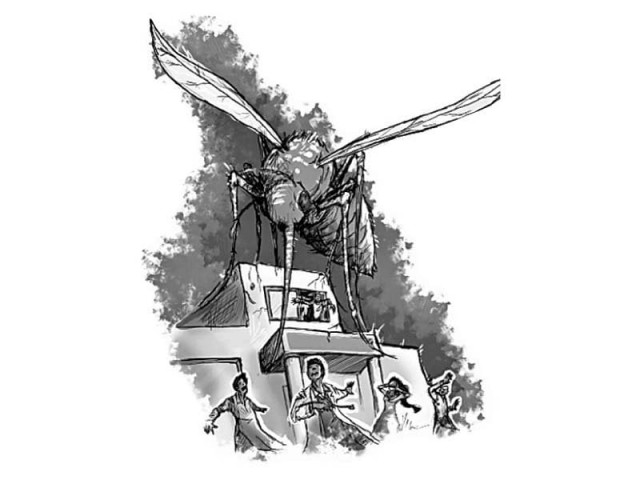Polyclinic issues dengue protocol
SAPM on Health, Punjab health minister, hospital heads, district admin put heads together against mosquitos

According to a statement, a meeting was co-chaired by SAPM on Health Dr Zafar Mirza, and Health Minister Punjab Dr Yasmeen Rashid for in-depth review of preventive and curative aspects of response in areas of concern. Besides, heads of all hospitals, the coordination meeting was also attended by the district administration and health management teams of Rawalpindi and Islamabad.
It was decided that for effective coordination, public representatives from Rawalpindi will be regularly attending the morning meetings in the Ministry of National Health Services, Regulations and Coordination chaired by SAPM on health.
The meeting was informed that Islamabad Municipal Corporation (IMC) Directorate General Health Services and Islamabad Capital Territory (ICT) Health Department are conducting regular larva surveillance and instituting urgent response measures through rapid response teams.
It was shared that within Islamabad affected UCs include Rawat, Koral and Tarlai while in Rawalpindi, Case Clustering is observed in Potohar Town including Airport Housing Society, Gulbahar Scheme, Wakeel Colony, Dhoke Munshi and Kot Jabbi.
A daily fact sheet is being released to keep the communities informed on evolving situation. Thanks to the increased awareness, people with minor symptoms are also getting themselves tested.
Protocol issued
The Federal Government Polyclinic (FGPC) hospital on Friday issued health protocols for its doctors, paramedical staff and nurses for disease management and proper treatment of patients suffering from dengue fever.
Assistant Executive Director Federal Government Polyclinic (FGPC) and Focal Person for Dengue Control, Dr Abdul Wali Khan Friday said that under protocols, the hospital has fixed criteria for patients' admission, referral, discharge and treatment methodology at hospital.
He said that those patients will be admitted on priority with co-morbidity like diabetes, hypertension, ischemic heart disease, coagulopathies, morbid obesity, renal failure and chronic liver disease.
He said that the hospital will also immediate give admission to those patients with age more than 65 years, pregnant women and patients facing social factors that limit follow-up like living far from health facility, no transport and living alone.
Dr Wali said that all those patients will also be provided admission in the hospital with having other medical warning signs and rising haematocrit (HCT) accompanied by reducing platelet count as per laboratory criteria.
He said that no patient will be discharged till he or she has stable haematocrit, good habitat and improved general health, complete recovery from organ failure, good urinary output, resolved bleeding episode, no distress is dyspnea due to ascities or effusion, rising pattern of platelet count (more than 50,000) and no febrile for 24 hours.
He said that as per protocols, the doctors and deputed staff will be responsible for regular lab investigation of dengue patients that included detection of dengue virus protein (NS1) from day first to day fifth and detection of antibody (IgM) from day fifth onward.
Similarly, there will be regular blood CP test to know rising hematocrit, thrombocytopenia and leukopenia besides liver function tests to check greater elevation of the AST as compared to the ALT. He added tests like ECG and Cardiac Enzymes for observing Myocarditis are also necessary.
He added the hospital staff at dengue wards will regular fill the monitoring sheet of every patient with having name, age, gender, date and status of all tests like BP, ALT, TLC, Hb, HctPP, pulse and PLT.
Dr Wali said that the hospital staff will be responsible to prepare a chart for every patient for having calculation of total fluids during critical phase with mentioning of age, deficit, and total fluid quota.
Published in The Express Tribune, September 28th, 2019.



















COMMENTS
Comments are moderated and generally will be posted if they are on-topic and not abusive.
For more information, please see our Comments FAQ